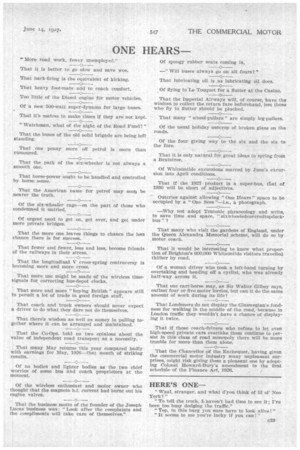ONE HEARS
Page 41

If you've noticed an error in this article please click here to report it so we can fix it.
"More road work, fewer Unemployed."
That it is better to go slow and save woe.
That back-firing is the equivalent of kicking.
That heavy foot-mats add to coach comfort.
Too little of the Diesel engine for motor vehicles.
Of a new 500-watt super-dynamo for large buses.
That it's useless to make times if they are not kept.
"Watchman, what of the night of the Road Fund?"
That the buses of the old solid brigade are being left standing.
That one penny more off petrol is more than rumoured.
That the path of the six-wheeler is not always a smooth one.
That horse-power Ought to be handled and controlled by horse sense.
That the American name for petrol may soon. be nearer the truth.
Of the six-wheeler rage—on the condemned it untried, part of those who Of urgent need to get on, get over, and get under more private bridges.
That the more one leaves things to chance the less chance there is for success.
That fewer and fewer, less and less, become friends of the railways in their stress. -- That the longitudinal V cross-spring controversy is becoming more and more cross.
That more use might be made of the wireless timesignals for\ correcting bus-depot clocks.
That more and more "buying British" appears still to permit a lot of trade in good foreign stuff.
That coach and truck owners should never expect a driver to do what they dare not do themselves.
That there's wisdom as well as money in pulling together where it can be arranged and maintained.
That the Co-Ops. hold no two opinions about the value of independent road transport as a necessity.
That many May returns this year compared badly with earnings for May, 1926—that month of striking results. .
Of no bodies and lighter bodies as the two chief worries of some bus and coach proprietors at the moment.
Of the wireless enthusiast and motor owner who thought that the magneto h.t. current had burnt out his engine valves.
That the business motto of the founder of the Joseph Lucas business was: "Look after the complaints and the compliments will take care of themselves." Of spongy rubber seats coming in.
—" Will buses always go on all fours?"
That lubricating oil is as lubricating oil does.
Of flying to Le Touquet for a flutter at the Casino.
That the Imperial Airways will, of course, have the wisdom to collect the return fare beforehand, lest those who fly to flutter should be plucked.
That many " wheel-pullers " are simply leg-pullers.
Of the usual holiday outcrop of broken glass on the roads.
Of the four giving way to the six and the six to the fore.
That it is only natural for great ideas to spring from a Braintree.
Of Whitsuntide excursions marred by June's excursion into April conditions.
That if the 1927 product is a super-bus, that of 1930 will be short of adjectives.
Outcries against allowing "One Hears" space to be occupied by a "One Sees "—i.e., a photograph.
—Why not adopt Teutonic phraseology and write, to save time and space, " sixwiteeledCoveredtopdeckbus " ?
That many who visit the gardens of England, under the Queen Alexandra Memorial scheme, will do so by motor coach.
That it would be interesting to know what proportion of Brighton's 600,000 Whitsuntide visitors travelled thither by road.
Of a woman driver who took a left-hand turning by overtaking and heading off a cyclist, who was already half-way across it.
That one cart-horse May, as Sir Walter Gilbey says, outlast four or five motor lorries, but can it do the same amount of work during its life?
That Londoners do not display the Glaswegian's fondness for walking in the middle of-the road, because in London traffic they wouldn't have a chance of displaying it twice.
That if those coach-drivers who refuse to let even high-speed private cars overtake them continue to persist in this class of road monopoly there will be more trouble for more than them alone.
That the Chancellor of the Exchequer, having given the commercial motor industry many unpleasant surprises, might risk giving them a pleasant one by adopting Colonel Howard-Bury's amendment to the first schedule of the Finance Act, 1926.












































































































